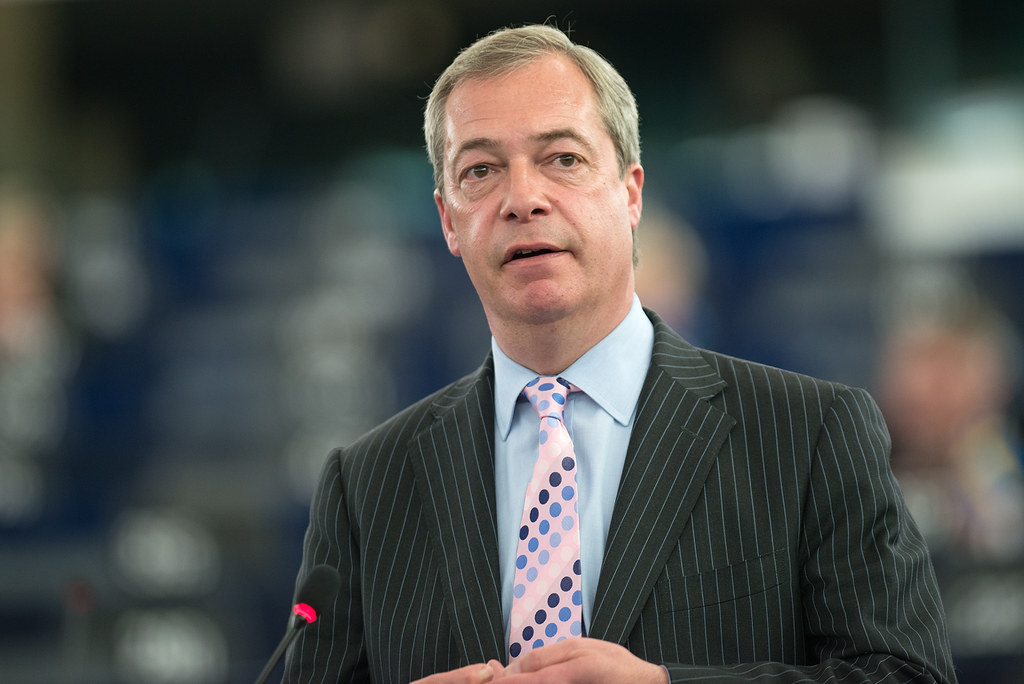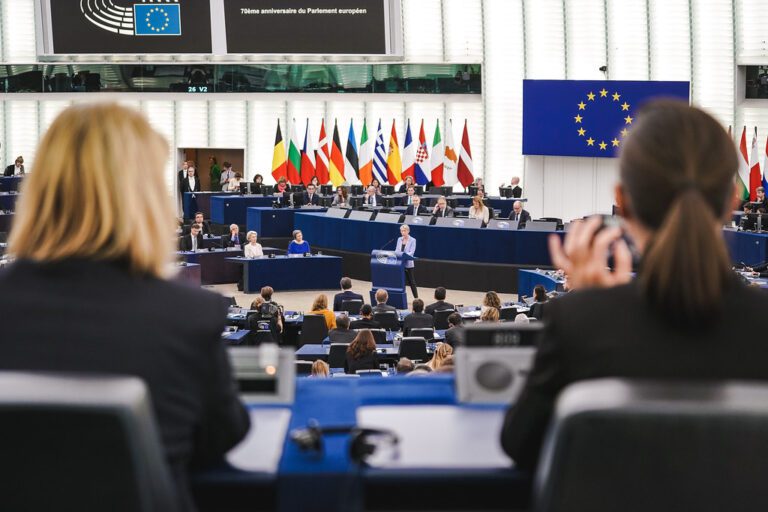
Most European countries have so far avoided making China a topic of domestic political contestation, with only a few parties across the continent playing a “China card”. That may soon change, with Nigel Farage’s post-Brexit declaration of China becoming his “next big battle to fight”.
If anyone expected Nigel Farage to leave politics after his decades-long struggle for Brexit came to fruition, they might want to think again. On 1 January 2021, hours after Britain’s transitory period after leaving the EU ended, Farage declared “stopping China is the next big battle to fight.” This came after his tweet from December 19 that read; “Christmas cancelled. Thank you, China,” a reference to China’s role in the COVID-19 pandemic.
In fact, Brexit might be the reason why this declaration had not come earlier. Donald Trump, Farage’s ideological ally, made China one of the central points of his presidential campaign in 2015. While in office, being ‘tough’ on China has become one of the cornerstones of the administration’s foreign policy, only to escalate when COVID-19 appeared.
Over the same period, Farage was busy with the Brexit referendum and subsequently its implementation. Besides, picking up on China at the time might not have been convenient as China was presented as one of Britain’s potential post-Brexit economic partners to replace the EU.
China as an Ideal Adversary
With Brexit out of the way, Farage can now invest all his effort into opposing China, which in his words is “a bigger threat to our independence than [the] EU”. Indeed, China might serve Farage’s populist ambitions even better.
Opinions of China have worsened amongst more than two-thirds of Britons over the past three years, more than in any of the other 13 European countries included in a recent Sinophone Borderlands survey. Moreover, those favoring Brexit hold more negative views of China than ‘Remain’ voters, according to a report drawing on the same survey. This is a reversal of positions from just two years ago, when another poll from November 2018 found that ‘Brexiteers’ held more favorable views of China than ‘Remainers’.
These changes, of course, reflect dynamics within China as well as within China’s foreign policy. The British public and media debate on China has become dominated by events in Hong Kong, particularly Beijing’s violation of the Sino-British Joint Declaration, as well as more troubling news about mass human rights violations in Xinjiang and the tightening of the Communist Party’s political stranglehold.
The growing US-China tensions have likely played a role, too, considering the ‘special relationship’ between London and Washington.
Low Politicization of China across Europe
It is interesting to note that China has so far not become a matter of domestic political contestation in most European countries.
In France, for instance, as much as supporters of President Emmanuel Macron and far-right leader Marine Le Pen might be divided on many issues, their perceptions of China are almost identical. Similarly, Sweden was found by the Sinophone Borderlands poll to have the most negative view of China among the 13 European countries, but supporters of all relevant political parties hold pretty much the same opinions of China. In fact, this same dynamic is almost unanimous across the 13 countries surveyed by the project.
Arguably the only European country where China is a topic in domestic politics is the Czech Republic. This is mainly a result of domestic dynamics, where the polarization has escalated between the followers of late president Václav Havel and current President Miloš Zeman, who take radically different positions on China. As a result, supporters of various Czech political parties differ greatly when it comes to China.
Copying Farage?
The question is whether populists across Europe will copy Nigel Farage and adopt what may soon evolve into a radical anti-China rhetoric.
At present, continental Europe’s far-right constituency do not share significantly negative perceptions of China. In the UK, for instance, the voters of the Conservative Party hold more negative perceptions of China than the voters of UKIP. In Germany, voters of the Alternative for Germany (AfD) have some of the most positive views of China; the same is true for the far-right voters in Slovakia, Czech Republic, and some other countries.
At the same time, in the age of social media, narratives spread quickly. Indeed, quite a few populist politicians have made their careers on Facebook, Twitter, or Instagram, stirring the public opinion in their direction especially when it comes to issues such as minorities, foreigners, ideology or security. China ticks all of these boxes.
In fact, Farage isn’t the first of Europe’s populists to leech off of a most extreme version of anti-Beijing sentiment. Italy’s former Deputy Prime Minister and Interior Minister Matteo Salvini, head of the far-right Lega, swung to the anti-China side in 2020. In March, he said that China had committed “a crime against humanity” if it lied about the early stages of the COVID-19 pandemic and has more recently taken to castigating Italy as turning into a “Chinese colony”.
The Sinophone Borderlands survey reported that the voters of the Salvini’s League had some of the most negative views of China in Italy, while voters of another populist party, the Five Star Movement, led by a China-friendly Luigi Di Maio (Deputy Prime Minister and Foreign Minister), showed much more positive views. The Italian case shows the role party leaders play in driving the perceptions of their followers.
The Cold War Lesson
A historical episode from the Cold War-era United States can offer some lessons as to what may lay ahead of the populist forces in Europe in 2021.
In the early 1960s, the conservative movement in the U.S. split. On the one side, mainstream voices like William F. Buckley Jr. led a campaign to oust the John Birch Society from right-wing circles.
Named after an American missionary killed by Chinese communists in 1945, the Birch society followers took a most radical position of anti-communism, haranguing anyone who disagreed with them as fifth columnists, making demands for liberals to be arrested as “secret communist traitors”, and throwing around racist accusations against many in the civil-rights movement.
Buckley, also an ardent anti-communist, denounced the ‘Birchers’ as “far removed from common sense” and a threat not just to civility in America, but also the reputation of the conservative movement. He also pressured the Republican Party to cast off all associations with Robert W. Welch Jr, the group’s founder.
In essence, this conflict between Buckley and the ‘Birchers’, taking place within the confines of the conservative movement and its institutions, was a dispute over how the anti-communist campaign should be conducted: by reason or fear-mongering; by civility or conspiracy theory; by appeals to democracy and human rights or to ethnicity and nativism.
The stories of Birch society, Farage, or Trump may suggest that populists on the right have been more open to playing the anti-China card, yet this is not the iron rule. Prague’s liberal left leaning mayor of the Czech Pirate party, for instance, has arguably done so as well, to appeal to those voters critical of the overly China-friendly approach of current President Zeman, while bringing back memories of the principled stances of the late President Havel. Interestingly, even this arguably ‘principled’ stance did not preclude the mayor from issuing statements bordering on anti-Chinese xenophobia when suggesting that Chinese people from Wuhan remain a problematic category of tourists – in January 2021.
Wider Implications for EU-China Relations
Judging from the political successes of Trump and Farage when it comes to cajoling support for their causes, the conditions in 2021 might be ripe for European populists adopting and playing with the anti-China card.
Such a development could have important implications for the EU policy towards China, potentially making it more fragmented, politicized, and less predictable. Mainstream parties would have to respond to these dynamics and re-define their own policies on China. Yet, fine tuning of their position may prove difficult to communicate to the broad public, emotionally stressed from the COVID-19.
Eventually, we might instead observe a competition of who is more ‘tough’ on China, which will not serve the goal of a more prudent China policy.
This article draws on the results of the representative public opinion survey, for information about the project see the webpage of Sinophone Borderlands project.
Written by
Richard Q. Turcsányi
RQTurcsanyiRichard Q. Turcsányi is a Senior Researcher at Palacky University Olomouc, an Assistant Professor at Mendel University in Brno, and Program Director at the Central European Institute of Asian Studies (CEIAS) in Bratislava.
David Hutt
davidhuttjournoDavid Hutt is a political journalist based between the Czech Republic and the UK, reporting on British and European foreign policy, and Europe-Asia relations. He is a columnist at the Diplomat and Asia Times.


